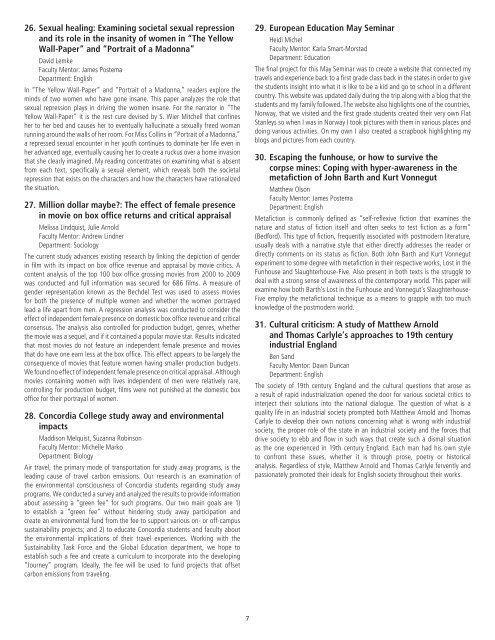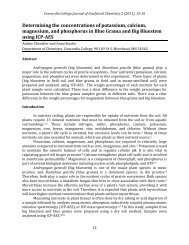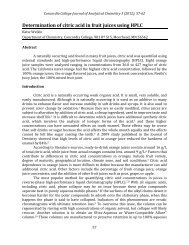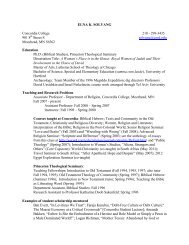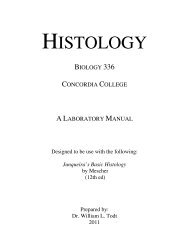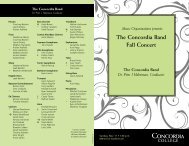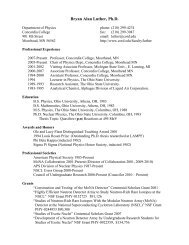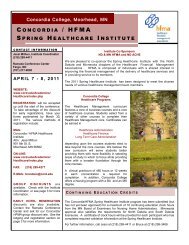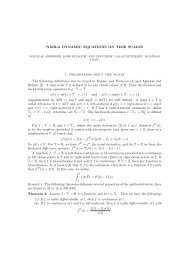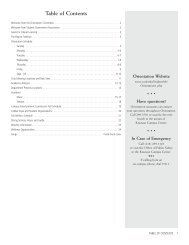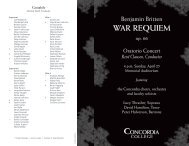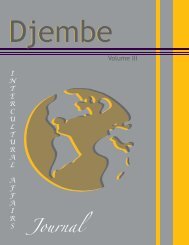Celebration of Student Scholarship - Concordia College
Celebration of Student Scholarship - Concordia College
Celebration of Student Scholarship - Concordia College
Create successful ePaper yourself
Turn your PDF publications into a flip-book with our unique Google optimized e-Paper software.
26. Sexual healing: Examining societal sexual repression<br />
and its role in the insanity <strong>of</strong> women in “The Yellow<br />
Wall-Paper” and “Portrait <strong>of</strong> a Madonna”<br />
David Lemke<br />
Faculty Mentor: James Postema<br />
Department: English<br />
In “The Yellow Wall-Paper” and “Portrait <strong>of</strong> a Madonna,” readers explore the<br />
minds <strong>of</strong> two women who have gone insane. This paper analyzes the role that<br />
sexual repression plays in driving the women insane. For the narrator in “The<br />
Yellow Wall-Paper” it is the rest cure devised by S. Wier Mitchell that confines<br />
her to her bed and causes her to eventually hallucinate a sexually freed woman<br />
running around the walls <strong>of</strong> her room. For Miss Collins in “Portrait <strong>of</strong> a Madonna,”<br />
a repressed sexual encounter in her youth continues to dominate her life even in<br />
her advanced age, eventually causing her to create a ruckus over a home invasion<br />
that she clearly imagined. My reading concentrates on examining what is absent<br />
from each text, specifically a sexual element, which reveals both the societal<br />
repression that exists on the characters and how the characters have rationalized<br />
the situation.<br />
27. Million dollar maybe?: The effect <strong>of</strong> female presence<br />
in movie on box <strong>of</strong>fice returns and critical appraisal<br />
Melissa Lindquist, Julie Arnold<br />
Faculty Mentor: Andrew Lindner<br />
Department: Sociology<br />
The current study advances existing research by linking the depiction <strong>of</strong> gender<br />
in film with its impact on box <strong>of</strong>fice revenue and appraisal by movie critics. A<br />
content analysis <strong>of</strong> the top 100 box <strong>of</strong>fice grossing movies from 2000 to 2009<br />
was conducted and full information was secured for 686 films. A measure <strong>of</strong><br />
gender representation known as the Bechdel Test was used to assess movies<br />
for both the presence <strong>of</strong> multiple women and whether the women portrayed<br />
lead a life apart from men. A regression analysis was conducted to consider the<br />
effect <strong>of</strong> independent female presence on domestic box <strong>of</strong>fice revenue and critical<br />
consensus. The analysis also controlled for production budget, genres, whether<br />
the movie was a sequel, and if it contained a popular movie star. Results indicated<br />
that most movies do not feature an independent female presence and movies<br />
that do have one earn less at the box <strong>of</strong>fice. This effect appears to be largely the<br />
consequence <strong>of</strong> movies that feature women having smaller production budgets.<br />
We found no effect <strong>of</strong> independent female presence on critical appraisal. Although<br />
movies containing women with lives independent <strong>of</strong> men were relatively rare,<br />
controlling for production budget, films were not punished at the domestic box<br />
<strong>of</strong>fice for their portrayal <strong>of</strong> women.<br />
28. <strong>Concordia</strong> <strong>College</strong> study away and environmental<br />
impacts<br />
Maddison Melquist, Suzanna Robinson<br />
Faculty Mentor: Michelle Marko<br />
Department: Biology<br />
Air travel, the primary mode <strong>of</strong> transportation for study away programs, is the<br />
leading cause <strong>of</strong> travel carbon emissions. Our research is an examination <strong>of</strong><br />
the environmental consciousness <strong>of</strong> <strong>Concordia</strong> students regarding study away<br />
programs. We conducted a survey and analyzed the results to provide information<br />
about assessing a “green fee” for such programs. Our two main goals are 1)<br />
to establish a “green fee” without hindering study away participation and<br />
create an environmental fund from the fee to support various on- or <strong>of</strong>f-campus<br />
sustainability projects; and 2) to educate <strong>Concordia</strong> students and faculty about<br />
the environmental implications <strong>of</strong> their travel experiences. Working with the<br />
Sustainability Task Force and the Global Education department, we hope to<br />
establish such a fee and create a curriculum to incorporate into the developing<br />
“Journey” program. Ideally, the fee will be used to fund projects that <strong>of</strong>fset<br />
carbon emissions from traveling.<br />
7<br />
29. European Education May Seminar<br />
Heidi Michel<br />
Faculty Mentor: Karla Smart-Morstad<br />
Department: Education<br />
The final project for this May Seminar was to create a website that connected my<br />
travels and experience back to a first grade class back in the states in order to give<br />
the students insight into what it is like to be a kid and go to school in a different<br />
country. This website was updated daily during the trip along with a blog that the<br />
students and my family followed. The website also highlights one <strong>of</strong> the countries,<br />
Norway, that we visited and the first grade students created their very own Flat<br />
Stanleys so when I was in Norway I took pictures with them in various places and<br />
doing various activities. On my own I also created a scrapbook highlighting my<br />
blogs and pictures from each country.<br />
30. Escaping the funhouse, or how to survive the<br />
corpse mines: Coping with hyper-awareness in the<br />
metafiction <strong>of</strong> John Barth and Kurt Vonnegut<br />
Matthew Olson<br />
Faculty Mentor: James Postema<br />
Department: English<br />
Metafiction is commonly defined as “self-reflexive fiction that examines the<br />
nature and status <strong>of</strong> fiction itself and <strong>of</strong>ten seeks to test fiction as a form”<br />
(Bedford). This type <strong>of</strong> fiction, frequently associated with postmodern literature,<br />
usually deals with a narrative style that either directly addresses the reader or<br />
directly comments on its status as fiction. Both John Barth and Kurt Vonnegut<br />
experiment to some degree with metafiction in their respective works, Lost in the<br />
Funhouse and Slaughterhouse-Five. Also present in both texts is the struggle to<br />
deal with a strong sense <strong>of</strong> awareness <strong>of</strong> the contemporary world. This paper will<br />
examine how both Barth’s Lost in the Funhouse and Vonnegut’s Slaughterhouse-<br />
Five employ the metafictional technique as a means to grapple with too much<br />
knowledge <strong>of</strong> the postmodern world.<br />
31. Cultural criticism: A study <strong>of</strong> Matthew Arnold<br />
and Thomas Carlyle’s approaches to 19th century<br />
industrial England<br />
Ben Sand<br />
Faculty Mentor: Dawn Duncan<br />
Department: English<br />
The society <strong>of</strong> 19th century England and the cultural questions that arose as<br />
a result <strong>of</strong> rapid industrialization opened the door for various societal critics to<br />
interject their solutions into the national dialogue. The question <strong>of</strong> what is a<br />
quality life in an industrial society prompted both Matthew Arnold and Thomas<br />
Carlyle to develop their own notions concerning what is wrong with industrial<br />
society, the proper role <strong>of</strong> the state in an industrial society and the forces that<br />
drive society to ebb and flow in such ways that create such a dismal situation<br />
as the one experienced in 19th century England. Each man had his own style<br />
to confront these issues, whether it is through prose, poetry or historical<br />
analysis. Regardless <strong>of</strong> style, Matthew Arnold and Thomas Carlyle fervently and<br />
passionately promoted their ideals for English society throughout their works.


